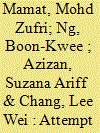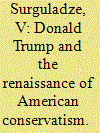|
|
|
Sort Order |
|
|
|
Items / Page
|
|
|
|
|
|
|
| Srl | Item |
| 1 |
ID:
144848


|
|
|
|
|
| Summary/Abstract |
This paper examines the influences of Malaysia's Federation Land Development Authority (FELDA) scheme in fostering inclusive rural development. Based on the model of holistic inclusive development, the paper investigates the performance of FELDA from four perspectives: social development, industrialisation, modernisation and basic needs. The main findings of the study indicate that, to a large extent, the scheme has successfully stimulated both the social and economic development of the community. Nonetheless, establishing a strong trust, social cohesion and rapport between the public authorities and community remain the main challenges in determining the success of this state-led agenda. Moreover, keeping traditional values in the modern system will be the key principle for the sustainability of the programme if plans are made to adopt the scheme in other regions.
|
|
|
|
|
|
|
|
|
|
|
|
|
|
|
|
| 2 |
ID:
192844


|
|
|
|
|
| Summary/Abstract |
This paper examines the associations between democratic performance, secular–traditional value orientation, and satisfaction with democracy in India and Pakistan through the lens of democratic performance and modernization theory. In an analysis of data from the 2012 World Values Survey, respect for human rights (one of two measures of democratic performance) has a stronger effect on satisfaction with democracy in India than in Pakistan. Freedom of choice influenced satisfaction with democracy only in India. Rather than having a direct effect, secular–traditional value orientation moderates the relationship between freedom of choice and satisfaction with democracy.
|
|
|
|
|
|
|
|
|
|
|
|
|
|
|
|
| 3 |
ID:
152678


|
|
|
|
|
| Summary/Abstract |
IT SEEMS that the West is gradually turning to conservatism. At least this is how Donald Trump's victory at the 2016 presidential elections can be interpreted together with Brexit and the much stronger positions of the right-wing parties in Europe. The left liberal forces that fell into the trap of their own ideology and propaganda proved unable to adequately assess the developments in their own countries and elsewhere in the world.
|
|
|
|
|
|
|
|
|
|
|
|
|
|
|
|
| 4 |
ID:
192479


|
|
|
|
|
| Summary/Abstract |
The article analyzes “traditional values” through the lens of history,
philosophy, and political science in the context of the main social and
political processes within Western modernity. From such a perspective,
the notion of ‘traditional values’ comes as an important element of the
liberal-conservative approach characteristic of Western modernity as
opposed to the prevalent emancipatory approach. The history of relations
between the West and Russia shows that Russia has traditionally acted
as a “conservative balancer” in the system of international relations that
developed in the 19th century. At the end of the 20th century, following the
collapse of the USSR and the end of the Cold War, radical left-liberal elites
gained the upper hand in the West.
|
|
|
|
|
|
|
|
|
|
|
|
|
|
|
|
| 5 |
ID:
146764


|
|
|
|
|
| Summary/Abstract |
Russia’s emergence as a leading opponent of universal human rights is one of the defining features of the Putin era. Under the banner of ‘traditional values’, Russian diplomats and clerics have re-forged cultural relativism into a weapon that can be used by repressive regimes to deflect criticism of their human rights records. This article examines the contribution of Nataliya Narochnitskaya, a historian and nationalist politician, to this exercise in authoritarian soft power. By tracing the formation of Narochnitskaya’s ideas and their adoption by state institutions, it demonstrates that the ‘traditional values’ campaign was intricately bound up with the collapse of Russian democracy.
|
|
|
|
|
|
|
|
|
|
|
|
|
|
|
|
| 6 |
ID:
193266


|
|
|
|
|
| Summary/Abstract |
While several studies on the issue have shown that traditional beliefs affect people's political behavior and preferences, very little attention has been paid to how traditional beliefs influence electoral behavior. The only study that has attempted to link traditional beliefs and electoral behavior has done so by analyzing the case of Togo where the party system has been traditionally fairly stable and unfragmented. The case of Indonesia, on the other hand, has undergone significant changes since the end of the Orde Baru, and what was once a fairly unfragmented party system now displays high levels of fragmentation. Hence, it is particularly interesting to explore how the presence/diffusion of traditional beliefs shapes the voters’ choices in a changing, increasingly fragmented, democratizing political system. Moreover, in reviewing the literature on Indonesian elections, we find that, first, the study of electoral behavior in Indonesia has made little effort to employ existing theoretical frameworks; second, quantitative studies are scarce; and third, there are practically no micro-level quantitative studies on electoral behavior. In this article, we assess whether and to what extent the electoral choice of a voter is affected by whether and to what extent they hold on to traditional beliefs by performing statistical analyses of original survey data. We find that voters with a traditional mindset are more likely to vote for the secular parties in the ruling coalition than voters who do not hold traditional beliefs.
|
|
|
|
|
|
|
|
|
|
|
|
|
|
|
|
| 7 |
ID:
189787


|
|
|
|
|
| Summary/Abstract |
Psychologically, this is understandable. The growing demand for ideology is natural, since a coherent ideology helps consolidate society in critical situations. At the same time, many still remember the ideological quests of the late Yeltsin era. Back then, unofficial and official media outlets deliberately turned such quests into clownery designed to highlight the value disorientation in society, the loss of Russian identity, and the lack of national thought. Liberal propaganda portrayed all of that as a fundamental characteristic of the Russian collective consciousness, not as a result of propaganda efforts per se.
|
|
|
|
|
|
|
|
|
|
|
|
|
|
|
|
| 8 |
ID:
193142


|
|
|
|
|
| Summary/Abstract |
Russia's full-scale war against Ukraine represents a critical juncture for the role gender plays in European security. We argue that the Russian invasion of Ukraine is not only gendered in the way other conflict are, but the war's essential novelty lies in the fact that it is explicitly fought for the so-called traditional values, against gender and sexual equalities. Drawing on local decolonial insights and theoretical concepts of liberal/illiberal gender orders, we contrast the Russian neo-traditionalism with the Ukrainian account of the Russian invasion, while seeking to uncover how an imagination of Europe is constitutive for these gendered discourses. We show that the construction of the narratives is a circular process of ever more pronounced neo-traditionalism by Russia which sees Europe as its decadent Other. We demonstrate that these discourses have real consequences as the Russian illiberal gender order justifies and wages real war against Ukraine and gender is turning into the central battlefield both in the figurative and the literal sense of the word. Russian accounts contrast with Ukraine's hybridised, but increasingly emancipatory discourses and practices which have been playing a fundamental role in Ukraine's resistance to the Russian invasion.
|
|
|
|
|
|
|
|
|
|
|
|
|
|
|
|
|
|
|
|
|